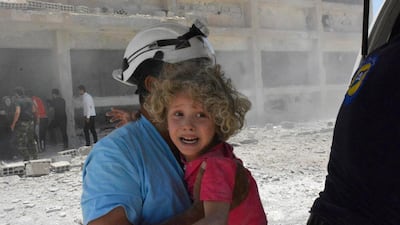Britain’s foreign secretary Jeremy Hunt praised the work of the White Helmets on Thursday while welcoming the leader of the Syrian volunteer group to the UK.
Raed Al Saleh met Jeremy Hunt and Middle East minister Alistair Burt on a visit to London to raise awareness about the necessity of finding peace in the war-torn country.
The White Helmets, named for their distinctive headwear, were formed during the conflict and provided emergency humanitarian assistance to rebel-held areas of Syria.
“Few people have to make the kind of moral choices that faced White Helmet Raed Al Saleh, who I was privileged to meet today,” Mr Hunt said.
“The White Helmets risked life and limb to save more than 115,000 lives during the Syrian conflict, despite attacks at the hands of the Syrian regime and the Russian military. The UK is proud to stand behind them.”
Mr Al Saleh thanked the support of the British people, which “enabled our volunteers to provide essential life-saving support to more than 115,000 persons and services to more than four million Syrian civilians who live under daily risk of violence in Syria”.
The White Helmets receive charitable funding from the US, Britain and other western governments. But the group has been labelled a “terrorist” organisation by the Syrian regime, which has waged a war of disinformation against them.
Earlier this year, Britain and its western allies coordinated an international effort to evacuate 422 members of the civil defence force and their families from southern Syria, under threat from Bashar Al Assad’s advancing troops.
Britain has since made resettlement offers to around 100 of those rescued from Deera province.
_______________
Read more:
US-backed Syrian Kurdish fighters on alert for Turkish attack
French mothers in Syria faced with terrible choice
_______________
Mr Al Saleh said he feared for the stability of the ceasefire in his home province of Idlib, which was brokered between Turkey and Russia to prevent further bloodshed.
“There’s a general feeling of détente as well as fears that the constant breaches by the Syrian regime and the Russians might cause the agreement to fail,” Mr Al Saleh told the BBC earlier on Thursday.


